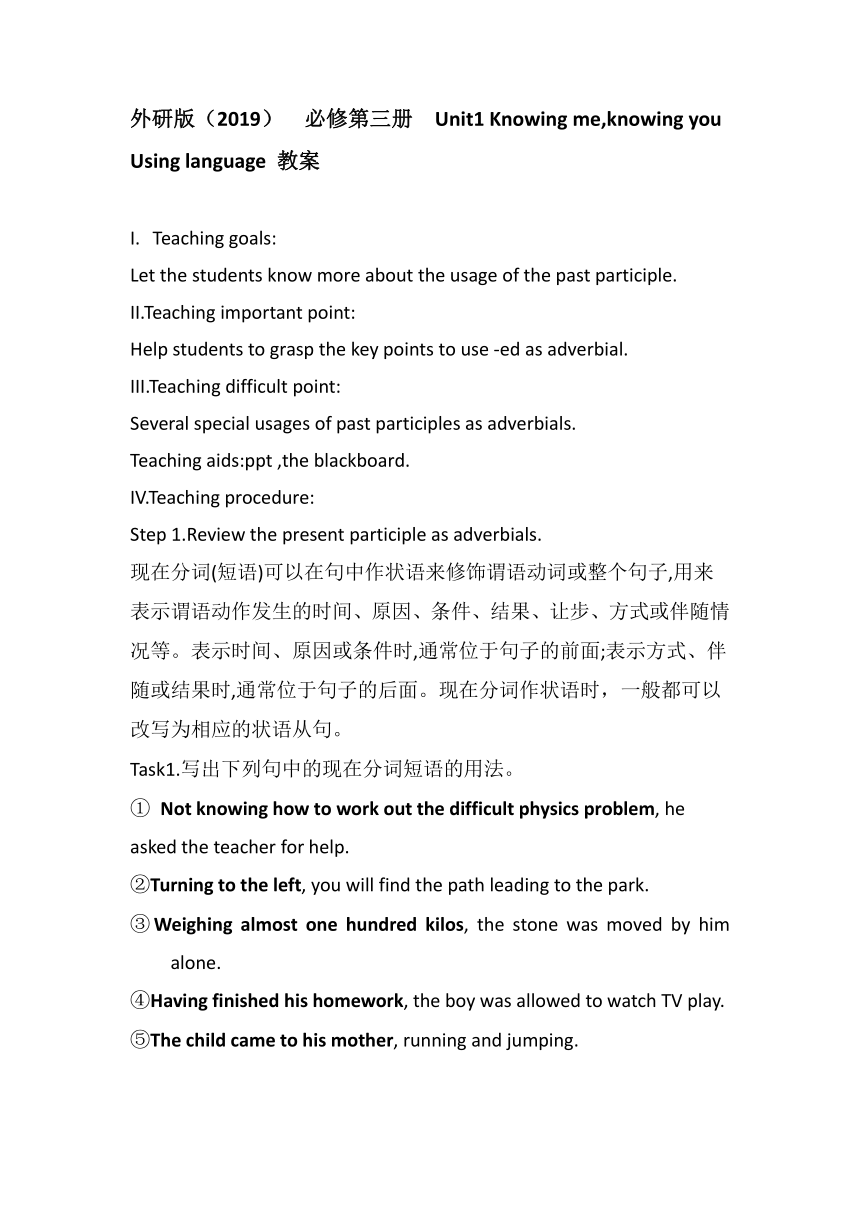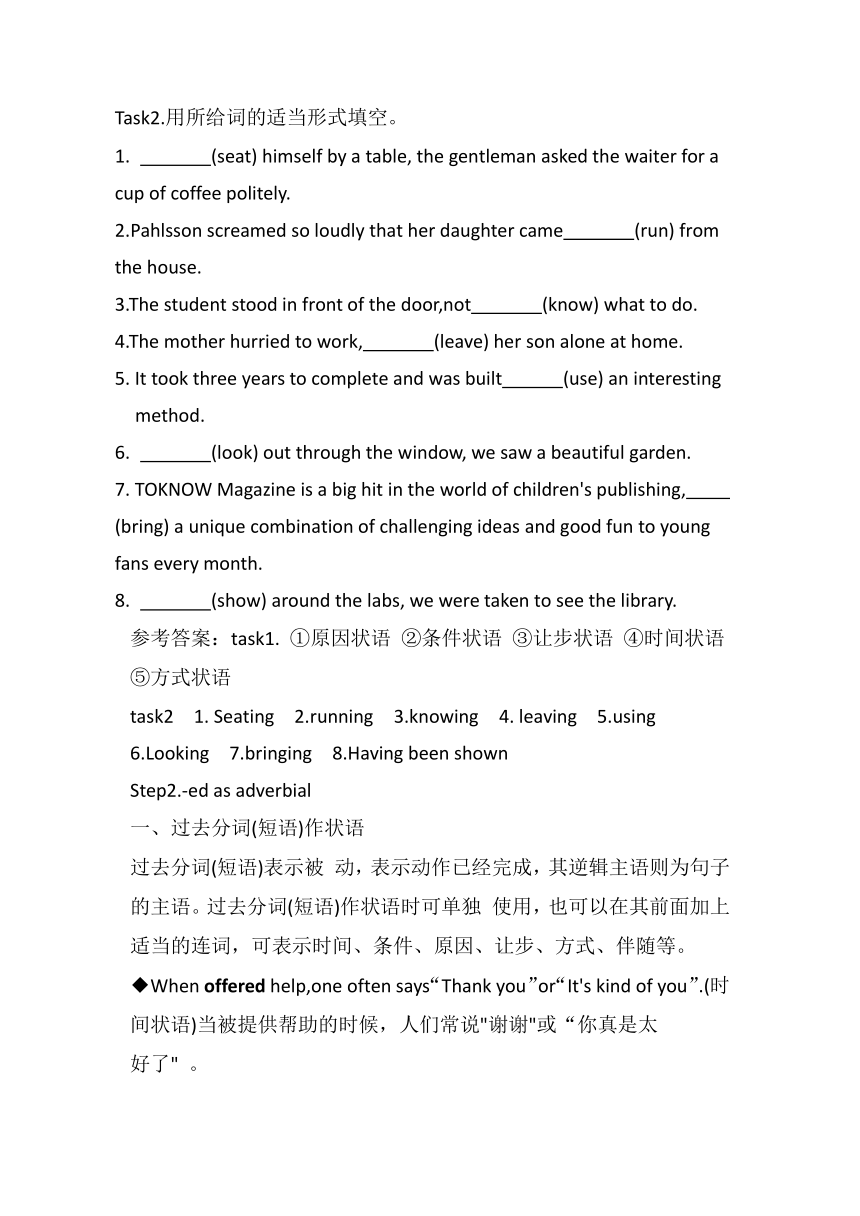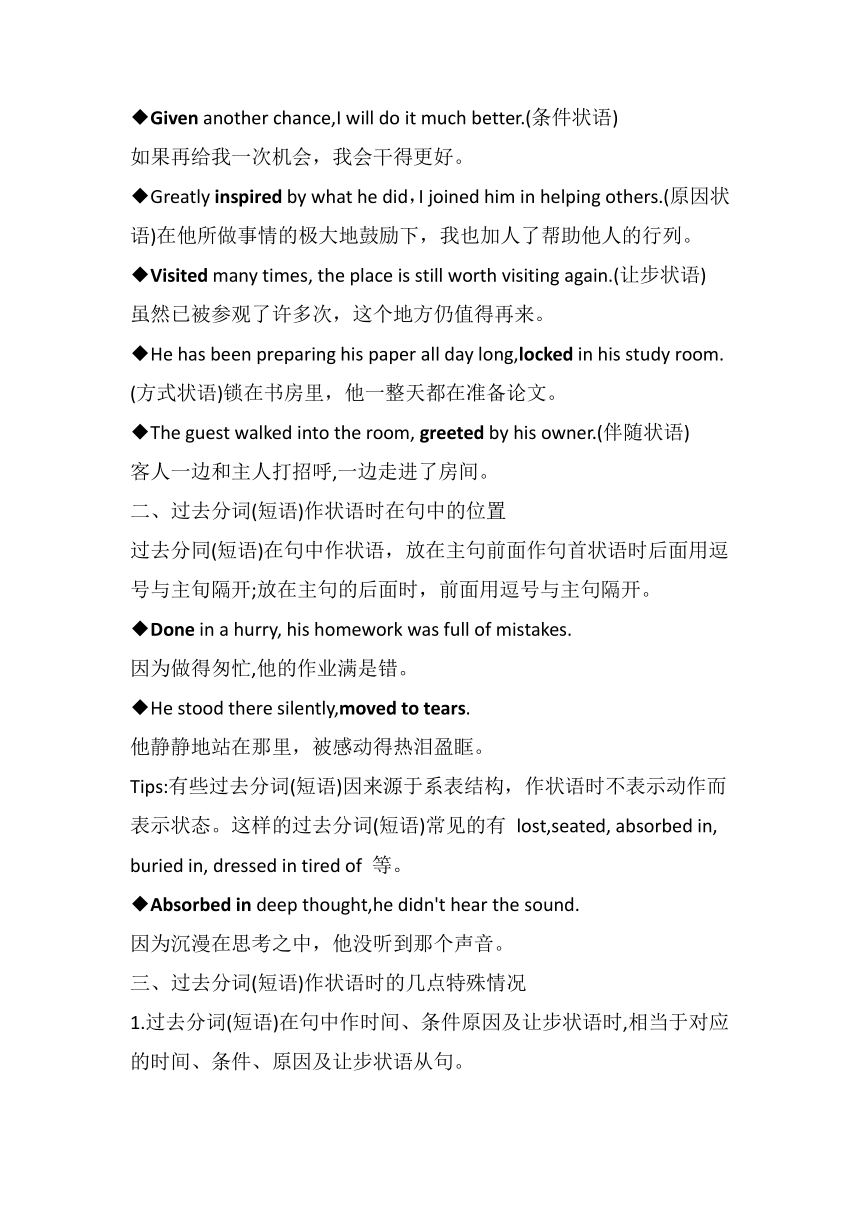外研版(2019)必修第三册Unit1 Knowing me,knowing you Using language 教案
文档属性
| 名称 | 外研版(2019)必修第三册Unit1 Knowing me,knowing you Using language 教案 |  | |
| 格式 | doc | ||
| 文件大小 | 91.5KB | ||
| 资源类型 | 教案 | ||
| 版本资源 | 外研版(2019) | ||
| 科目 | 英语 | ||
| 更新时间 | 2022-05-08 08:53:19 | ||
图片预览



文档简介
外研版(2019) 必修第三册 Unit1 Knowing me,knowing you Using language 教案
I. Teaching goals:
Let the students know more about the usage of the past participle.
II.Teaching important point:
Help students to grasp the key points to use -ed as adverbial.
III.Teaching difficult point:
Several special usages of past participles as adverbials.
Teaching aids:ppt ,the blackboard.
IV.Teaching procedure:
Step 1.Review the present participle as adverbials.
现在分词(短语)可以在句中作状语来修饰谓语动词或整个句子,用来表示谓语动作发生的时间、原因、条件、结果、让步、方式或伴随情况等。表示时间、原因或条件时,通常位于句子的前面;表示方式、伴随或结果时,通常位于句子的后面。现在分词作状语时,一般都可以改写为相应的状语从句。
Task1.写出下列句中的现在分词短语的用法。
① Not knowing how to work out the difficult physics problem, he asked the teacher for help.
②Turning to the left, you will find the path leading to the park.
③Weighing almost one hundred kilos, the stone was moved by him alone.
④Having finished his homework, the boy was allowed to watch TV play.
⑤The child came to his mother, running and jumping.
Task2.用所给词的适当形式填空。
1. (seat) himself by a table, the gentleman asked the waiter for a cup of coffee politely.
2.Pahlsson screamed so loudly that her daughter came (run) from the house.
3.The student stood in front of the door,not (know) what to do.
4.The mother hurried to work, (leave) her son alone at home.
5. It took three years to complete and was built (use) an interesting method.
6. (look) out through the window, we saw a beautiful garden.
7. TOKNOW Magazine is a big hit in the world of children's publishing, (bring) a unique combination of challenging ideas and good fun to young fans every month.
8. (show) around the labs, we were taken to see the library.
参考答案:task1. ①原因状语 ②条件状语 ③让步状语 ④时间状语 ⑤方式状语
task2 1. Seating 2.running 3.knowing 4. leaving 5.using 6.Looking 7.bringing 8.Having been shown
Step2.-ed as adverbial
一、过去分词(短语)作状语
过去分词(短语)表示被 动,表示动作已经完成,其逆辑主语则为句子的主语。过去分词(短语)作状语时可单独 使用,也可以在其前面加上适当的连词,可表示时间、条件、原因、让步、方式、伴随等。
◆When offered help,one often says“Thank you”or“It's kind of you”.(时间状语)当被提供帮助的时候,人们常说"谢谢"或“你真是太
好了" 。
◆Given another chance,I will do it much better.(条件状语)
如果再给我一次机会,我会干得更好。
◆Greatly inspired by what he did,I joined him in helping others.(原因状语)在他所做事情的极大地鼓励下,我也加人了帮助他人的行列。
◆Visited many times, the place is still worth visiting again.(让步状语)
虽然已被参观了许多次,这个地方仍值得再来。
◆He has been preparing his paper all day long,locked in his study room. (方式状语)锁在书房里,他一整天都在准备论文。
◆The guest walked into the room, greeted by his owner.(伴随状语)
客人一边和主人打招呼,一边走进了房间。
二、过去分词(短语)作状语时在句中的位置
过去分同(短语)在句中作状语,放在主句前面作句首状语时后面用逗号与主旬隔开;放在主句的后面时,前面用逗号与主句隔开。
◆Done in a hurry, his homework was full of mistakes.
因为做得匆忙,他的作业满是错。
◆He stood there silently,moved to tears.
他静静地站在那里,被感动得热泪盈眶。
Tips:有些过去分词(短语)因来源于系表结构,作状语时不表示动作而表示状态。这样的过去分词(短语)常见的有 lost,seated, absorbed in, buried in, dressed in tired of 等。
◆Absorbed in deep thought,he didn't hear the sound.
因为沉漫在思考之中,他没听到那个声音。
三、过去分词(短语)作状语时的几点特殊情况
1.过去分词(短语)在句中作时间、条件原因及让步状语时,相当于对应的时间、条件、原因及让步状语从句。
◆Seen from the top of the mountain,the whole town looks more beautiful.
=When it is seen from the top of the mountain, the whole town looks more beautiful.
从山顶上看,整个城镇看起来更美了。
◆Given ten more minutes,we would finish the work perfectly.
=If we were given ten more minutes,we would finish the work perfectly.
如果多给十分钟,我们会完美地完成这份工作。
◆Greatly touched by his words, she was full of tears.
=Because she was greatly touched by his words,she was full of tears.
由于被他的话深深地感动了.她满眼泪花。
2.过去分词(短语)在旬中作伴随.方式等状语时,可改为句子的并列分句或并列谓语。
◆The teacher came into the room,followed by two students.
=The teacher came into the room, and he was followed by two students.
老师走进了这个房间,后面跟着两个学生。
◆Dressed in white,she looks more beautiful.
=She is dressed in white and looks more beautiful.
她穿着白色衣服,看起来更加漂亮了。
3过去分词(短语)作时间、条件或让步状语时,为了明确其意义,有时可在分词前加上when,while,if,once,unless,although等连词,相当于状语从句的省略。
◆Even if I am invited, I will not take part in the party.
=Even if invited, I will not take part in the party.
即使被邀请,我也不会参加那个宴会。
◆Unless you are asked to speak, you should remain silent at the meeting.
=Unless asked to speak, you should remain silent at the meeting.
除非被要求说话,在会上你应该保持沉默。
Tips:
Before、after一般不与过去分词连用,因为这两个词还可作介词,后接being done的形式。
◆Before being taken to the zoo,the boy read many books about his favorite animals.
在被带去动物园之前,这个男孩读了很多关于他最事爱的动物的书。
V.Homework:
单句语法填空
1. (found)in Moscow after the 1905rvolution,the company eventually settled in Tel Aviv in the late 1920s.
2. (design)very cleverly to fit into corners, the shelf doesn't take up much room.
3. The new technology,if (apply)to rice growing, will help increase the grain output.
4. (hesitate) over whether to leave or not,the child stayed where he was.
5. (warn) by their manager, they became more careful in doing their work.
6. (receive) the letter from her best friend, Lucy ran towards home excitedly.
7. (bring) up in a poor family,what Mary needs most is money,a lot of money.
8. (surround) by a river, the park had a central pond with flowers floating in it.
9. ______(disappoint)at failing in the math exam, John wouldn't like to talk about it to his parents.
10. The flowers presented by your friend can grow well if______(water)
twice every week.
11.______(see)from the sop of the tower,we can see a sea of flowers at the south foot of the mountain.
12. These problems, if not________(solve)properly,will seriously affect the growth of teenagers.
13.If______ (separate) from his best friends for a long time, the little boy will feel lonely.
14.______(attract) by the beauty of nature, the girl from the city decided to spend another two days on the farm.
15.Mary locked herself in her study for the whole weekend______
(prepare) for the coming examinations.
16.______(surprise) and happy,Tony stood up and accepted the prize.
17.Grandpa Lin, deeply______(move),thanked him again and again.
18. The children soon fell asleep,______(exhaust) because of the long journey.
参考答案:1.Founded 2.Designed 3.applied 4.Hesitating 5. Warn ed 6.Having received 7.Brought 8.Surrounded 9.Disappointed 10. watered 11.Seeing 12.solved 13. separated14.Attracted 15.preparing
16. Surprised 17. moved18.exhausted
17.
I. Teaching goals:
Let the students know more about the usage of the past participle.
II.Teaching important point:
Help students to grasp the key points to use -ed as adverbial.
III.Teaching difficult point:
Several special usages of past participles as adverbials.
Teaching aids:ppt ,the blackboard.
IV.Teaching procedure:
Step 1.Review the present participle as adverbials.
现在分词(短语)可以在句中作状语来修饰谓语动词或整个句子,用来表示谓语动作发生的时间、原因、条件、结果、让步、方式或伴随情况等。表示时间、原因或条件时,通常位于句子的前面;表示方式、伴随或结果时,通常位于句子的后面。现在分词作状语时,一般都可以改写为相应的状语从句。
Task1.写出下列句中的现在分词短语的用法。
① Not knowing how to work out the difficult physics problem, he asked the teacher for help.
②Turning to the left, you will find the path leading to the park.
③Weighing almost one hundred kilos, the stone was moved by him alone.
④Having finished his homework, the boy was allowed to watch TV play.
⑤The child came to his mother, running and jumping.
Task2.用所给词的适当形式填空。
1. (seat) himself by a table, the gentleman asked the waiter for a cup of coffee politely.
2.Pahlsson screamed so loudly that her daughter came (run) from the house.
3.The student stood in front of the door,not (know) what to do.
4.The mother hurried to work, (leave) her son alone at home.
5. It took three years to complete and was built (use) an interesting method.
6. (look) out through the window, we saw a beautiful garden.
7. TOKNOW Magazine is a big hit in the world of children's publishing, (bring) a unique combination of challenging ideas and good fun to young fans every month.
8. (show) around the labs, we were taken to see the library.
参考答案:task1. ①原因状语 ②条件状语 ③让步状语 ④时间状语 ⑤方式状语
task2 1. Seating 2.running 3.knowing 4. leaving 5.using 6.Looking 7.bringing 8.Having been shown
Step2.-ed as adverbial
一、过去分词(短语)作状语
过去分词(短语)表示被 动,表示动作已经完成,其逆辑主语则为句子的主语。过去分词(短语)作状语时可单独 使用,也可以在其前面加上适当的连词,可表示时间、条件、原因、让步、方式、伴随等。
◆When offered help,one often says“Thank you”or“It's kind of you”.(时间状语)当被提供帮助的时候,人们常说"谢谢"或“你真是太
好了" 。
◆Given another chance,I will do it much better.(条件状语)
如果再给我一次机会,我会干得更好。
◆Greatly inspired by what he did,I joined him in helping others.(原因状语)在他所做事情的极大地鼓励下,我也加人了帮助他人的行列。
◆Visited many times, the place is still worth visiting again.(让步状语)
虽然已被参观了许多次,这个地方仍值得再来。
◆He has been preparing his paper all day long,locked in his study room. (方式状语)锁在书房里,他一整天都在准备论文。
◆The guest walked into the room, greeted by his owner.(伴随状语)
客人一边和主人打招呼,一边走进了房间。
二、过去分词(短语)作状语时在句中的位置
过去分同(短语)在句中作状语,放在主句前面作句首状语时后面用逗号与主旬隔开;放在主句的后面时,前面用逗号与主句隔开。
◆Done in a hurry, his homework was full of mistakes.
因为做得匆忙,他的作业满是错。
◆He stood there silently,moved to tears.
他静静地站在那里,被感动得热泪盈眶。
Tips:有些过去分词(短语)因来源于系表结构,作状语时不表示动作而表示状态。这样的过去分词(短语)常见的有 lost,seated, absorbed in, buried in, dressed in tired of 等。
◆Absorbed in deep thought,he didn't hear the sound.
因为沉漫在思考之中,他没听到那个声音。
三、过去分词(短语)作状语时的几点特殊情况
1.过去分词(短语)在句中作时间、条件原因及让步状语时,相当于对应的时间、条件、原因及让步状语从句。
◆Seen from the top of the mountain,the whole town looks more beautiful.
=When it is seen from the top of the mountain, the whole town looks more beautiful.
从山顶上看,整个城镇看起来更美了。
◆Given ten more minutes,we would finish the work perfectly.
=If we were given ten more minutes,we would finish the work perfectly.
如果多给十分钟,我们会完美地完成这份工作。
◆Greatly touched by his words, she was full of tears.
=Because she was greatly touched by his words,she was full of tears.
由于被他的话深深地感动了.她满眼泪花。
2.过去分词(短语)在旬中作伴随.方式等状语时,可改为句子的并列分句或并列谓语。
◆The teacher came into the room,followed by two students.
=The teacher came into the room, and he was followed by two students.
老师走进了这个房间,后面跟着两个学生。
◆Dressed in white,she looks more beautiful.
=She is dressed in white and looks more beautiful.
她穿着白色衣服,看起来更加漂亮了。
3过去分词(短语)作时间、条件或让步状语时,为了明确其意义,有时可在分词前加上when,while,if,once,unless,although等连词,相当于状语从句的省略。
◆Even if I am invited, I will not take part in the party.
=Even if invited, I will not take part in the party.
即使被邀请,我也不会参加那个宴会。
◆Unless you are asked to speak, you should remain silent at the meeting.
=Unless asked to speak, you should remain silent at the meeting.
除非被要求说话,在会上你应该保持沉默。
Tips:
Before、after一般不与过去分词连用,因为这两个词还可作介词,后接being done的形式。
◆Before being taken to the zoo,the boy read many books about his favorite animals.
在被带去动物园之前,这个男孩读了很多关于他最事爱的动物的书。
V.Homework:
单句语法填空
1. (found)in Moscow after the 1905rvolution,the company eventually settled in Tel Aviv in the late 1920s.
2. (design)very cleverly to fit into corners, the shelf doesn't take up much room.
3. The new technology,if (apply)to rice growing, will help increase the grain output.
4. (hesitate) over whether to leave or not,the child stayed where he was.
5. (warn) by their manager, they became more careful in doing their work.
6. (receive) the letter from her best friend, Lucy ran towards home excitedly.
7. (bring) up in a poor family,what Mary needs most is money,a lot of money.
8. (surround) by a river, the park had a central pond with flowers floating in it.
9. ______(disappoint)at failing in the math exam, John wouldn't like to talk about it to his parents.
10. The flowers presented by your friend can grow well if______(water)
twice every week.
11.______(see)from the sop of the tower,we can see a sea of flowers at the south foot of the mountain.
12. These problems, if not________(solve)properly,will seriously affect the growth of teenagers.
13.If______ (separate) from his best friends for a long time, the little boy will feel lonely.
14.______(attract) by the beauty of nature, the girl from the city decided to spend another two days on the farm.
15.Mary locked herself in her study for the whole weekend______
(prepare) for the coming examinations.
16.______(surprise) and happy,Tony stood up and accepted the prize.
17.Grandpa Lin, deeply______(move),thanked him again and again.
18. The children soon fell asleep,______(exhaust) because of the long journey.
参考答案:1.Founded 2.Designed 3.applied 4.Hesitating 5. Warn ed 6.Having received 7.Brought 8.Surrounded 9.Disappointed 10. watered 11.Seeing 12.solved 13. separated14.Attracted 15.preparing
16. Surprised 17. moved18.exhausted
17.
